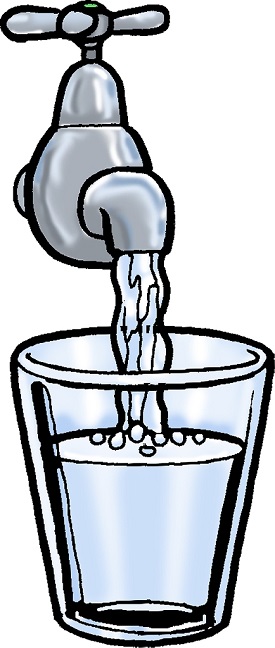
The answer is “no,” but there are qualifications. Certainly, water used to irrigate plants and make nutrient solutions needs to be free of constituents that could harm plants, including both organic substances and inorganic elements. The inorganic elements or compounds that can be detrimental to plants are sodium (Na) if greater than 70 ppm, boron (B) if greater than 2.0 ppm, and the anions chloride (Cl-) if greater than 100 ppm, and bicarbonate (HCO3-) if greater than 40 ppm. Water that is calcium carbonate (CaCO3) saturated will have a pH of 8.3, requiring acidification if used.
A major factor that frequently determines water quality is its source, river and lake water being potentially of poor quality, while well, rain, and domestic drinking water of less questionable quality. What is the best advice? Have the water assayed for its elemental content by a laboratory skilled in water analysis techniques. Then treat the water if there are substances found that would be harmful to plants or find another water source.
Some recommend only the use of “pure” water, meaning that the water is void of all organic and inorganic substances. This can be accomplished by distillation (used in the past, although some desalination plants use distillation), but more recently by either ion exchange or reverse osmosis, procedures that are done using easily available devices, but expensive in terms of operation energy cost as well as chemical costs. The discharge of the removed impurities also can be a challenge since the discharge may be considered “hazardous waste.”
Pure water, or what had been frequently referred to in the past as “distilled water,” is highly corrosive; that is, it will easily absorb or dissolve substances that it comes in contact with. So, “pure water’ will extract substances from the surface of the container in which it is stored as well as piping walls during transfer; making the storage vessel and piping a source for “added substances” when handling pure water.
Passing water through fine sand or similar type filter will remove suspended particles but will not remove dissolved substances. However, charcoal and Millipore-type filters will remove organic molecules, the extent of removal depending on the characteristics of the filter material. If water is being used from a surface water supply as well as rainwater, such filtering is desirable unless the water is to be passed through an ion exchange system or reverse osmosis device. Those who are not familiar with the jargon, “RO water” means that obtained by reverse osmosis.
Ion exchange means exchanging one ion for another. Ion-exchange systems in which the exchangeable ion is sodium (Na+) is not suitable for generating water for either irrigation or hydroponic use.
A hydroponic tomato grower was purifying his well water using a reverse osmosis device. During a 2-day electrical power outage at his farm, his tomato plants in full fruit production needed water. However, the only source of water available under pressure was city-provided drinking water. Reluctantly, he watered his tomato plants with this water, and to his surprise with no adverse effects. After the harvest season, he calculated what had been the cost for treating his well water versus what he would have paid if he had used city water. He found that his well-reverse osmosis-treated water cost him about 2.5 times greater than what he would have paid if he had used city water.
In general, most domestic drinking water is relatively free of elements that could significantly affect most plants. The only exception would be fluoride (F), since there are some plant species that are particularly sensitive to this element. In addition, the supplier of such water is required to periodically report the content of both organic and inorganic constituents, information that is easily obtained since it is public knowledge. Most domestic water suppliers treat their water with various chemicals that might be considered “detrimental to plants,” but essential to ensure safety as drinking water. Some growers will store such water in an aeration tank to remove chlorine as well as similar volatile substances, finding the water after aeration suitable for plant use.
It is not uncommon that well water will contain two major essential plant nutrient elements, the cations calcium (Ca2+) and magnesium (Mg2+). Some waters may also contain varying levels of elements that could adversely affect plants if found in substantial concentrations, such as the cations sodium (Na+) and iron [(mainly ferrous iron (Fe2+)], and the anions fluoride (F-) and sulfide (S-). Knowing what elements are in the water and their concentration, the grower may be able to utilize what is naturally present to reduce the need for adding that element to formulate a nutrient solution, saving the cost of reagents needed to add that element. Also, knowing what exists naturally in the water will keep a grower from adding an element in excess over that required in the formulation of a nutrient solution. As was stated earlier, knowing what is in the water being considered for hydroponic use will provide the guidance as to what steps need to be taken, i.e., treatment, going to another source, or taking advantage of what already exists in the water source.
Biologically, water is referred to as the “universal solvent.” It is also unique in that the water molecule is a polar compound carrying both a positive and negative charge. It is the only substance that can exist in all three physical phases, solid, liquid, and gaseous vapor, at the same time.
Dr. J. Benton Jones, Jr. has a PhD in Agronomy and is the author of several books. Dr. Jones has written extensively on hydroponic growing and outdoor vegetable gardening employing sub-irrigation hydroponic growing systems.
Related Articles & Free Email Newsletter Sign Up
3 Things You Need to Know when Buying a Prepared Nutrient Solution Formulation
pH? Widely Used, Little Understood
Phosphorus is Needed by Plants But Too Much Hurts More Than it Helps




Comment here